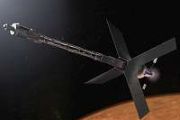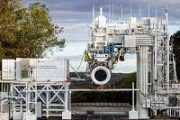
Copernical Team
Indian Navy and ISRO conduct astronaut well deck recovery trials for Gaganyaan Mission
 The Indian Navy and the Indian Space Research Organisation (ISRO) have advanced preparations for Gaganyaan's recovery operations by conducting "Well Deck" recovery trials on December 6, 2024. The exercise took place under the Eastern Naval Command using a well deck-equipped ship off the coast of Visakhapatnam.
A ship's well deck can be flooded to allow docking of smaller vessels, landing c
The Indian Navy and the Indian Space Research Organisation (ISRO) have advanced preparations for Gaganyaan's recovery operations by conducting "Well Deck" recovery trials on December 6, 2024. The exercise took place under the Eastern Naval Command using a well deck-equipped ship off the coast of Visakhapatnam.
A ship's well deck can be flooded to allow docking of smaller vessels, landing c Equatorial Launch Australia shifts focus to new Queensland spaceport site
 Equatorial Launch Australia (ELA) has announced the immediate cessation of operations at the Arnhem Space Centre in the Northern Territory, citing unresolved lease negotiations. The company will relocate its spaceport to a new site in Queensland, marking a significant shift in its operational strategy.
The decision stems from the Northern Land Council's (NLC) repeated delays in approving a
Equatorial Launch Australia (ELA) has announced the immediate cessation of operations at the Arnhem Space Centre in the Northern Territory, citing unresolved lease negotiations. The company will relocate its spaceport to a new site in Queensland, marking a significant shift in its operational strategy.
The decision stems from the Northern Land Council's (NLC) repeated delays in approving a Scientists share early results from NASA's solar eclipse experiments
 On April 8, 2024, a total solar eclipse swept across North America, from the western shores of Mexico, through the United States, and into northeastern Canada. For the eclipse, NASA helped fund numerous research projects and called upon citizen scientists in support of NASA's goal to understand how our home planet is affected by the Sun - including, for example, how our star interacts with Earth
On April 8, 2024, a total solar eclipse swept across North America, from the western shores of Mexico, through the United States, and into northeastern Canada. For the eclipse, NASA helped fund numerous research projects and called upon citizen scientists in support of NASA's goal to understand how our home planet is affected by the Sun - including, for example, how our star interacts with Earth A new discovery about the source of the vast energy in cosmic rays
 Ultra-high energy cosmic rays, which emerge in extreme astrophysical environments - like the roiling environments near black holes and neutron stars - have far more energy than the energetic particles that emerge from our sun. In fact, the particles that make up these streams of energy have around 10 million times the energy of particles accelerated in the most extreme particle environment on ea
Ultra-high energy cosmic rays, which emerge in extreme astrophysical environments - like the roiling environments near black holes and neutron stars - have far more energy than the energetic particles that emerge from our sun. In fact, the particles that make up these streams of energy have around 10 million times the energy of particles accelerated in the most extreme particle environment on ea Planets form sequentially like falling dominos
 New findings from radio astronomy reveal that planetary systems form in a chain reaction, where the formation of one planet near a central star encourages the formation of subsequent planets farther out. This process mirrors the domino effect, with each planet facilitating the formation of the next.
Over 5,000 planetary systems have been identified so far, with more than 1,000 confirmed to
New findings from radio astronomy reveal that planetary systems form in a chain reaction, where the formation of one planet near a central star encourages the formation of subsequent planets farther out. This process mirrors the domino effect, with each planet facilitating the formation of the next.
Over 5,000 planetary systems have been identified so far, with more than 1,000 confirmed to Astrophysicists capture gamma-ray flare from supermassive black hole M87
 The first-ever photo of a black hole rocked the world in 2019, when the Event Horizon Telescope, or EHT, published an image of the supermassive black hole at the center of the galaxy M87, also known as Virgo A or NGC 4486, located in the constellation of Virgo. This black hole is surprising scientists again with a teraelectronvolt gamma-ray flare - emitting pho
The first-ever photo of a black hole rocked the world in 2019, when the Event Horizon Telescope, or EHT, published an image of the supermassive black hole at the center of the galaxy M87, also known as Virgo A or NGC 4486, located in the constellation of Virgo. This black hole is surprising scientists again with a teraelectronvolt gamma-ray flare - emitting pho Planning autonomous surface missions on ocean worlds
This request seems a bit unusual, so we need to confirm that you're human. Please press and hold the button until it turns completely green. Thank you for your cooperation!
Press and hold the button
If you believe this is an error, please contact our support team.
185.132.36.159 : 023c0266-0eeb-48ec-a066-825afea0
Personal AI assistants could help astronauts on long missions
This request seems a bit unusual, so we need to confirm that you're human. Please press and hold the button until it turns completely green. Thank you for your cooperation!
Press and hold the button
If you believe this is an error, please contact our support team.
185.132.36.159 : 0287f8b3-10a3-4826-946e-440958e9
Japan space firm postpones second attempt at orbit
This request seems a bit unusual, so we need to confirm that you're human. Please press and hold the button until it turns completely green. Thank you for your cooperation!
Press and hold the button
If you believe this is an error, please contact our support team.
185.132.36.159 : ebdf4f4c-2a09-45e1-860b-392a3dda
Elon Musk wants to turn SpaceX's Starbase site into a Texas city
This request seems a bit unusual, so we need to confirm that you're human. Please press and hold the button until it turns completely green. Thank you for your cooperation!
Press and hold the button
If you believe this is an error, please contact our support team.
185.132.36.159 : 6a7af52d-289f-47d9-a3a4-da0509dc





























